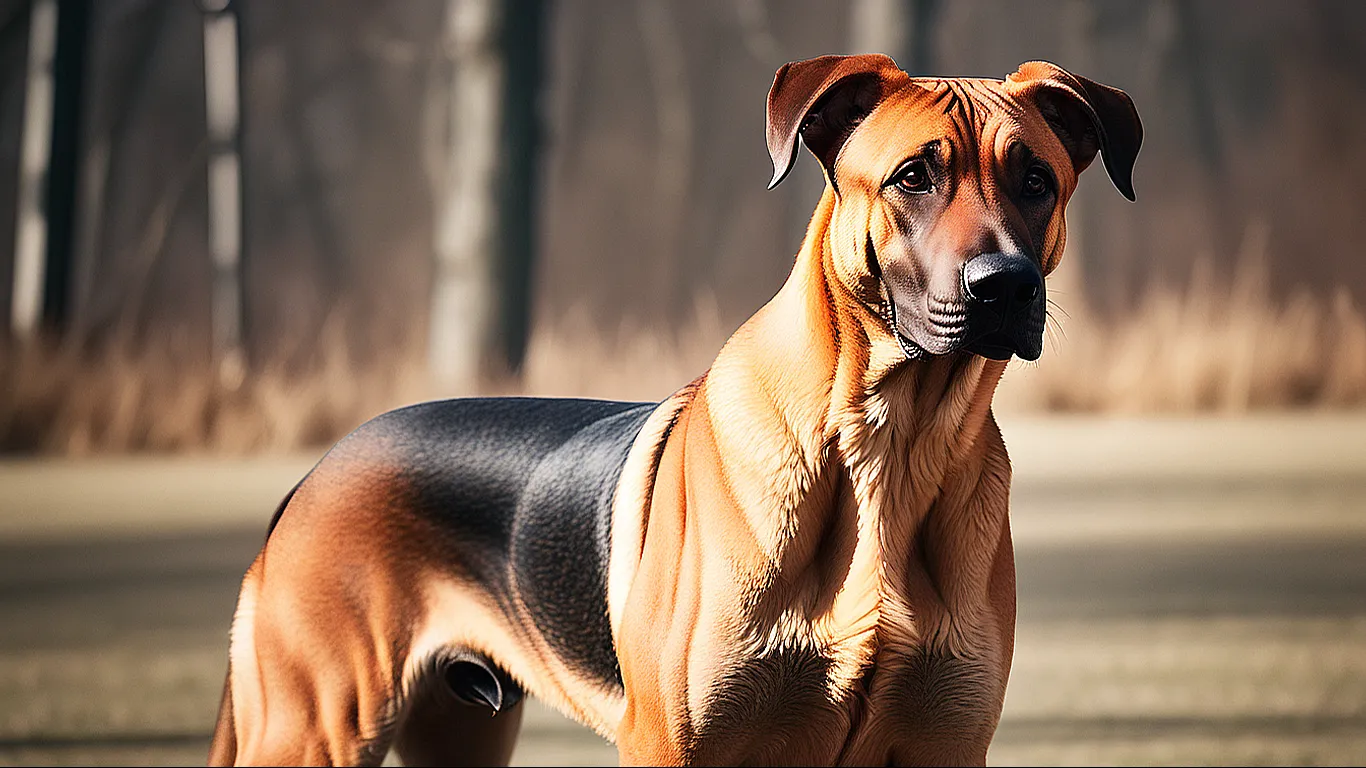Welcome to our comprehensive guide on the Rhodesian Ridgeback German Shepherd Mix, an extraordinary canine breed that blends the distinctive qualities of two remarkable breeds—the Rhodesian Ridgeback and the German Shepherd.
In this article, we will delve into the fascinating characteristics, temperament, training requirements, and health considerations of this unique hybrid breed.
Whether you’re considering adopting a Rhodesian Ridgeback German Shepherd Mix or simply seeking to expand your knowledge of canine companions, you’ve come to the right place.
Let’s embark on an enlightening journey!
Key Information
Here are the key takeaways from the blog
| Characteristic | Information |
|---|---|
| Country of origin | N/A (Mixed breed) |
| Weight MALE | 75-100 pounds |
| Weight FEMALE | 50-85 pounds |
| Height MALE | 24-30 inches at the shoulder |
| Height FEMALE | 22-28 inches at the shoulder |
| Coat color | Varies, typically a mix of colors and patterns |
| Life-span | 10-14 years |
| Litter size | 6-10 puppies |
| Nickname | Rhodesian Shepherd, Ridgeback Shepherd |
| Eyes | Dark and expressive |
| Temperament | Loyal, intelligent, protective, energetic |
| Exercise needs | High, requires regular exercise and mental stimulation |
| Grooming level | Moderate grooming needs, regular brushing and occasional baths |
| Apartment living | Can adapt with proper exercise, preferably a home with a yard |
| For family | Good family dog, affectionate and protective |
| Novice Owner | May require experienced handling due to size and energy |
Rhodesian Ridgeback German Shepherd Mix Pros and Cons
Pros
- Loyalty: Both Rhodesian Ridgebacks and German Shepherds are renowned for their loyalty, resulting in a devoted and protective companion.
- Intelligence: With the German Shepherd’s high intelligence, this mix is likely to be trainable and adaptable, making them a joy to work with.
- Athleticism: The combination of two athletic breeds means your dog will likely excel in various physical activities and exercise routines.
- Versatility: Drawing from the diverse traits of both breeds, this mix can be a versatile companion suitable for different roles and activities.
- Protectiveness: Inheriting protective instincts from both parent breeds, the mix can serve as an excellent watchdog for your family.
- Distinctive Appearance: Expect a distinctive appearance, blending the Rhodesian Ridgeback’s signature ridge with the noble features of the German Shepherd.
Cons
- High Energy: Both Rhodesian Ridgebacks and German Shepherds are energetic breeds, requiring significant exercise and mental stimulation
- Grooming Needs: Depending on the coat type, regular grooming may be necessary to manage shedding and maintain your dog’s overall coat health.
- Prey Drive: Be aware of a potentially strong prey drive, which may require careful socialization, especially around smaller pets.
- Space Requirements: Due to their size and energy levels, these dogs may need ample space for exercise, making them better suited for homes with yards.
- Training Challenges: Both parent breeds can be independent and strong-willed, necessitating consistent training and a firm handler.
- Potential Health Issues: Mixed breeds can inherit health issues from either parent breed, such as hip dysplasia or skin conditions. Regular veterinary care is crucial.
Origins and Heritage
The Rhodesian Ridgeback German Shepherd Mix, also known as the Ridgeback Shepherd, inherits a captivating lineage from both parent breeds.
The Rhodesian Ridgeback traces its roots back to Southern Africa, where it was originally bred for hunting large game, particularly lions. Renowned for its distinctive ridge of hair along its back, this breed exhibits strength, athleticism, and unwavering loyalty.
On the other hand, the German Shepherd, originating from Germany, has earned its place among the most popular and versatile breeds worldwide.
Developed as a herding dog, the German Shepherd impresses with its intelligence, agility, and protective instincts.
With such esteemed ancestry, it comes as no surprise that the Rhodesian Ridgeback German Shepherd Mix embodies an exceptional combination of traits that make it an outstanding companion.
Physical Attributes

The Ridgeback Shepherd showcases a striking physique that exudes power and elegance.
As a medium to large-sized dog, it typically stands between 22 and 28 inches (56-71 cm) at the shoulder and weighs between 70 and 95 pounds (32-43 kg).
Its muscular build, coupled with a well-defined ridge along its back, creates an imposing presence.
The coat of the Rhodesian Ridgeback German Shepherd Mix is often a captivating blend of its parent breeds’ characteristics.
Common coat colors include various shades of brown, tan, black, and sable.
The length and texture of the fur can vary, with some individuals exhibiting a shorter coat similar to the Rhodesian Ridgeback, while others have a longer, denser coat reminiscent of the German Shepherd.
Temperament and Personality
When it comes to temperament, the Rhodesian Ridgeback German Shepherd Mix thrives as an affectionate, loyal, and protective companion.
This breed tends to form strong bonds with its family members, displaying unwavering devotion and a natural inclination to safeguard their well-being.
With a well-socialized Ridgeback Shepherd, you can expect a friendly and sociable demeanor towards strangers, making it an excellent choice for families and individuals alike.
As an intelligent and alert breed, the Ridgeback Shepherd excels in various roles, including as a working dog, search and rescue companion, and even a therapy dog.
Its adaptability and versatility make it highly trainable, provided consistent positive reinforcement and structured training methods are employed.
Exercise and Training Needs
To ensure the Rhodesian Ridgeback German Shepherd Mix thrives both mentally and physically, regular exercise and mental stimulation are vital components of its routine.
Being a blend of two highly active breeds, this mix requires ample opportunities for exercise, such as daily walks, jogs, or engaging play sessions in a securely fenced area.
Furthermore, incorporating mental challenges into the Ridgeback Shepherd’s routine helps channel its intelligence and prevent boredom-induced behavioral issues.
Puzzle toys, obedience training, and interactive games that encourage problem-solving are excellent ways to keep this intelligent breed mentally stimulated.
Grooming Requirements
The grooming needs of the Rhodesian Ridgeback German Shepherd Mix are generally moderate and manageable.
The exact grooming routine will depend on the individual dog’s coat length and texture.
If your Ridgeback Shepherd inherits a shorter coat, a weekly brushing session.
If your Ridgeback Shepherd inherits a shorter coat, a weekly brushing session with a slicker brush or a grooming mitt will help keep the coat in good condition and minimize shedding.
For those with a longer coat, more frequent brushing may be necessary to prevent matting and tangles.
Regular maintenance of dental hygiene is essential for your Ridgeback Shepherd’s overall health.
Brushing their teeth several times a week with a dog-specific toothbrush and toothpaste is recommended to prevent dental issues such as plaque buildup and gum disease.
Nail trimming should be part of your grooming routine to keep your canine companion comfortable and prevent overgrown nails.
Additionally, routine ear cleaning using a gentle, dog-friendly ear cleaner can help prevent ear infections and keep their ears healthy.
Health Considerations
As with any mixed breed, the Rhodesian Ridgeback German Shepherd Mix may inherit a combination of health conditions from its parent breeds.
While hybrid vigor often contributes to overall robustness, it’s crucial to be aware of potential health concerns to ensure proactive care.
Some health conditions that may be seen in Rhodesian Ridgeback German Shepherd Mixes include hip and elbow dysplasia, which can cause joint pain and mobility issues.
Regular exercise, a balanced diet, and maintaining a healthy weight can help mitigate the risk of these conditions.
Other potential health concerns to monitor include bloat (gastric torsion), allergies, skin issues, and certain genetic conditions.
It’s important to consult with a reputable veterinarian who can provide guidance on preventive measures, routine check-ups, and any necessary screenings.
Training Tips for Success
When it comes to training the Rhodesian Ridgeback German Shepherd Mix, positive reinforcement techniques are highly effective due to their intelligence and eagerness to please.
Here are a few tips to ensure a successful training journey:
- Start early: Begin socialization and training as early as possible to establish a solid foundation and reinforce positive behaviors.
- Consistency and patience: Use consistent commands, reward desired behaviors, and be patient throughout the training process. Repetition and positive reinforcement will help your Ridgeback Shepherd grasp commands and behaviors more effectively.
- Mental stimulation: Engage your dog’s intellect by incorporating training exercises that challenge their problem-solving skills. Interactive toys, treat puzzles, and obedience training sessions will keep their minds sharp.
- Varied training sessions: Mix up training sessions with different environments, distractions, and tasks. This helps your dog generalize their training and adapt to various situations.
- Socialization: Expose your Rhodesian Ridgeback German Shepherd Mix to a wide range of people, animals, and environments from an early age. Proper socialization will foster confidence and reduce the likelihood of behavioral issues.
Remember, a well-trained and socialized Ridgeback Shepherd is a joy to have as a companion, and their intelligence and versatility make them capable of excelling in various activities and roles.
Conclusion
The Rhodesian Ridgeback German Shepherd Mix is a magnificent and versatile canine companion that combines the best qualities of its parent breeds.
With their striking appearance, loyal temperament, and intelligence, these dogs make excellent family pets, working dogs, or therapy companions.
By understanding the breed’s origins, physical attributes, temperament, training needs, and health considerations, you are well-equipped to provide optimal care for your Rhodesian Ridgeback German Shepherd Mix.
Remember to prioritize regular exercise, mental stimulation, and consistent training to ensure a happy and well-adjusted companion.
Whether you’re considering adopting a Ridgeback Shepherd or simply expanding your knowledge of canine breeds, we hope this comprehensive guide has provided valuable insights.
Embrace the journey of owning this remarkable hybrid breed and cherish the wonderful experiences and memories that await you.

